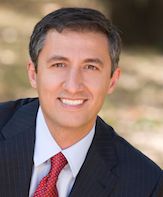Texas lawmaker: Pay attention to the UT law school favoritism

By Mark Lisheron | Watchdog.org
There was a time when state Rep. Giovanni Capriglione might have been surprised at the way the political establishment and much of the Texas press responded to the discovery of widespread political favoritism at the University of Texas School of Law.
In the last session of the Legislature, in his first term in office, Capriglione, R-Southlake, introduced a bill that would require that he and his fellow lawmakers publicly reveal contracts they or their family members might have with a governmental body.
The bill died a mostly unlamented death.
CAPRIGLIONE: Hall got dinged for doing his job.
“It was a transparency bill, and I thought, who could object to it,” Capriglione said. “I was surprised at the visceral personal attacks from colleagues on me. Am I surprised at how Wallace Hall has been treated? Not anymore.”
Wallace Hall is the University of Texas regent who followed a tip that state legislators had gotten special favors to get their children and the children of friends into UT law school. Rather than receive plaudits for his stewardship, Hall’s aggressive snooping won him an impeachment, led by some of the same people accused of securing the undeserved favors.
From the start, Hall has been portrayed by his political antagonists and much of the mainstream press as a right-wing appointee of Gov. Rick Perry with a hidden agenda to do damage to the University of Texas.
That portrayal became much harder to defend when Watchdog.org established conclusively the political favoritism Hall was chasing was true. Dozens of law school students, many of them with qualifications and test scores that would have otherwise barred them from the school, were politically connected, Watchdog.org learned.
Two of them, Richard Peña Raymond, D-Laredo, and Eddie Rodriguez, D-Austin, have together failed the bar exam five times and have so far not been admitted to the Texas bar.
A report by the office of Chancellor Francisco Cigarroa confirmed the political favoritism Watchdog.org reported. Balking for a month, Cigarroa decided a full external investigation was necessary.
And on the heels of these reports, Cigarroa has asked University President Bill Powers to resign or be fired. The regents, Hall included, will consider those options at a meeting Thursday.
Vindication for Hall? Hardly, Capriglione said. However shocking the revelations of politicians using their elected positions to get their kids into law school, the entire issue has, unfortunately, been reduced to a high-level political spat, taking sides with or against Powers.
Lt. Gov. David Dewhurst’s and former U.S. Senator Kay Bailey Hutchison’s appeals on behalf of Powers divert attention from the central issue of corruption in the UT admissions process, Capriglione said.
With Hutchison, if this doesn’t smack of a political vendetta (against Perry, who appointed Hall), nothing does,” Capriglione said. “The environment in Austin on this issue has become hyper-partisan and political, just like Washington.”
The reaction among his constituents, he said, is a deepening cynicism. As the political machines churn up the dirt, some of Capriglione’s constituents in the 98th District shrug off the political favoritism.
“I’ve had people tell me, well, isn’t that what the politicians always do,” Capriglione said. “That’s why people are so disgusted with us.”
Capriglione wants to know what the regents find Thursday before deciding what he thinks ought to be done with Powers. If there has been wrongdoing, the university should fire Powers immediately, and not allow him months to resign as some, including Dewhurst, have suggested.
“In a private company, if any employee has done something wrong, you fire them as soon as possible,” he said. “An employee like that staying around for months can do real damage to the reputation of UT.”
What concerns Capriglione more is the message the handling of Hall sends to every prospective political candidate or appointee in Texas.
“When I look at Wallace Hall, I think, am I next? Am I asking too many questions doing my job?” Capriglione asked. “I don’t see any problem with a regent asking for those documents. And look, he found stuff out. And for that you get dinged for doing your job. I don’t know anybody right now who wants to be a regent at UT.”
Capriglione is also disappointed in much of the coverage of the matter, the press preferring to remain riveted on the political circus, having never bothered to establish the truth of Hall’s contentions.
“I think if the rest of the media had done their jobs, the public would be asking what’s going on here,” he said. “But most people, unfortunately, are not paying much attention to this issue.”
The truth, contained in both the reporting of Watchdog.org and the chancellor’s report, is an admissions process at UT law hijacked for personal gain by people elected to a privileged position.
That process needs to be returned to the public, Capriglione said.
“Nobody in the Legislature is trying to hurt the University of Texas,” he said. ”We may have differing opinions about how to do it, but we’re all responsible to treat the process, whether it’s admissions or endowments, with the utmost transparency.”







